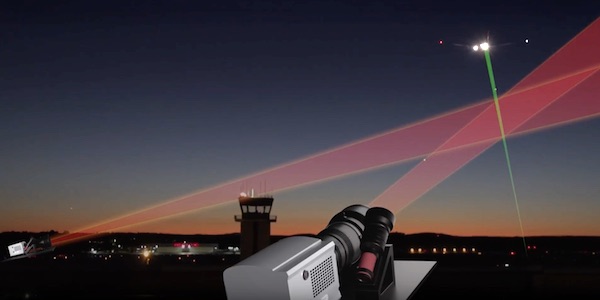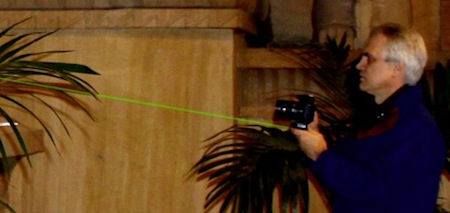Home
A comprehensive resource for safe and responsible laser use
US: MIT develops system to locate laser perpetrators using as few as two cameras, from miles away
The Laser Aircraft Strike Suppression Optical System (LASSOS) uses two or more low-light CCD sensor cameras that observe the night sky, each with a star tracker that determines the attitude of the sensor. The cameras observe a volume of airspace such as around an airport. Beam locations are identified by analyzing the two (or more) different views to find the endpoint of the laser beam.

In one test, LASSOS identified the ground location of a laser beam aimed into the sky, using two cameras located nine nautical miles away. The locations was determined within 30 seconds. The system was so accurate that it could differentiate between locations separated by only 5 meters.
A key attribute of LASSOS is that the final output is a Google Earth map with the beam and perpetrator location overlaid. This makes it easy for law enforcement to know the area they will be searching for the perpetrator.
An MIT press release gave no indication of potential installation and operational costs, and did not indicate any further plans for testing or implementation.
LASSOS was developed under Air Force Contract No. FA8721-05-C-0002 and/or FA8702-15-D-0001.
From a September 2017 MIT Lincoln Laboratory press release, reprinted below (click the “read more” link.) MIT also has a YouTube video of the system; the LASSOS description begins about 56 seconds into the video. Thanks to Greg Makhov, who brought this to our attention via a Tech Briefs article printed in January 2018.
World: Laser pointer focus/aiming aid for cameras

A promotional photo demonstrating the concept of the PinPoint Focus Assist
The manufacturer says the PinPoint complies with U.S. FDA safety regulations. It is said to be a Class 2 green DPSS diode with output power less than 1 milliwatt. The focus range is from 2.5ft/7.5m to 131ft/40m; the aiming range is 700ft/210m in low-light and “further in darkness”.
At their website, DeluxGear has an admirable list of safety warnings which include:
- Don’t aim at a person’s eyes. This can cause “temporary vision dysfunction such as flash blindness, disorientation or glare. This can be particularly dangerous if the exposed person is engaged in a vision-critical activity such as driving or other means of transportation.”
- Don’t aim it at a person without notifying them in advance.
- Don’t aim at a law enforcement officer as this is illegal in many jurisdictions.
- Never aim at vehicles including aircraft.
- Don’t allow a minor to use unsupervised. In some jurisdictions it is illegal for a minor to purchase or use a laser product
Incidentally, the beam on/off function is separate from the camera. This means the beam does NOT come on when the shutter button is pressed, but instead is controlled by a separate switch on the PinPoint.
From DeluxGear; click on the “Protect Your Gear” menu to read the list of safety warnings.
.